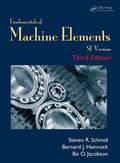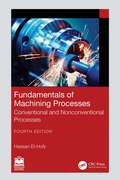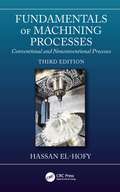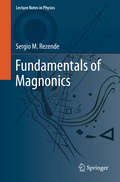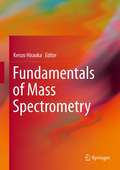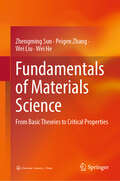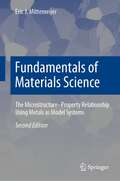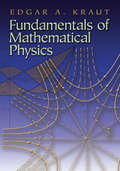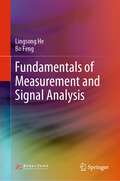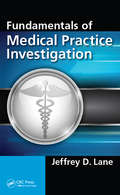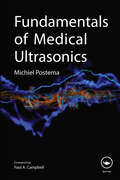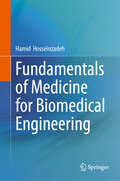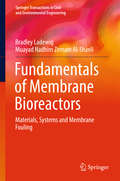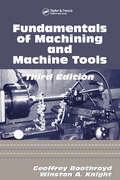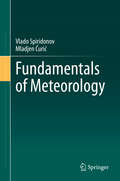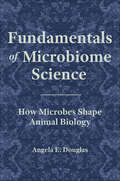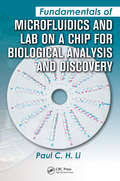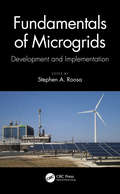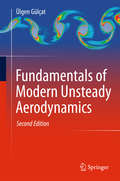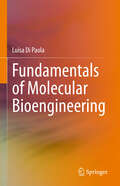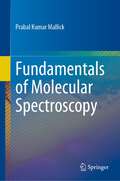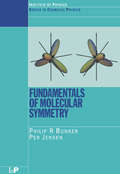- Table View
- List View
Fundamentals of Machine Elements: SI Version
by Steven R. Schmid Bernard J. Hamrock Bo. O. JacobsonNew and Improved SI Edition-Uses SI Units Exclusively in the TextAdapting to the changing nature of the engineering profession, this third edition of Fundamentals of Machine Elements aggressively delves into the fundamentals and design of machine elements with an SI version. This latest edition includes a plethora of pedagogy, providing a greater u
Fundamentals of Machining Processes: Conventional and Nonconventional Processes
by Hassan El-HofyThe latest edition of this textbook continues to bring you the essential principles of machining through cutting, abrasion, erosion, and combined processes. This updated edition has been enhanced and expanded to provide a more comprehensive understanding of the subject matter.Fundamentals of Machining Processes: Conventional and Nonconventional Processes, Fourth Edition introduces the concept of machinability and provides general guidelines for selecting a machining process. It covers the fundamentals of machining through erosion and hybrid processes, explaining the mechanisms that cause material removal, machining systems, and applications of each process. Additionally, this new edition includes a new chapter on thermal‑assisted (hot) machining techniques and a new chapter on processes used in micro and nanofabrication technologies. PowerPoint slides and a solutions manual are available for qualified textbook adoption.This is a very important and needed textbook for undergraduate students in a variety of engineering programs, including production, materials technology, industrial, manufacturing, mechatronics, marine, and mechanical engineering. Graduate students specializing in topics relevant to advanced machining will also find this book to be a valuable resource. In addition, professional engineers and technicians working in production technology can benefit greatly from the information provided in this edition.
Fundamentals of Machining Processes: Conventional and Nonconventional Processes, Third Edition
by Hassan El-HofyWritten by an expert with over 40 years of experience in research and teaching machining and related topics, this new edition textbook presents the principles and theories of material removal and applications for conventional, nonconventional and hybrid machining processes. The new edition is ideal for undergraduate students in production, materials, industrial, mechatronics, marine, mechanical, and manufacturing engineering programs, and also useful for graduate programs related to higher-level machining topics, as well as professional engineers and technicians. All chapters are updated, with additional chapters covering new topics of composite machining, vibration assisted machining and mass finishing operations.
Fundamentals of Magnonics (Lecture Notes in Physics #969)
by Sergio M. RezendeFundamentals of Magnonics is a textbook for beginning graduate students in the areas of magnetism and spintronics. The level of presentation assumes only basic knowledge of the origin of magnetism and electromagnetism, and quantum mechanics. The book utilizes elementary mathematical derivations, aimed mainly at explaining the physical concepts involved in the phenomena studied and enabling a deeper understanding of the experiments presented. Key topics include the basic phenomena of ferromagnetic resonance in bulk materials and thin films, semi-classical theory of spin waves, quantum theory of spin waves and magnons, magnons in antiferromagnets, parametric excitation of magnons, nonlinear and chaotic phenomena, Bose-Einstein condensation of magnons, and magnon spintronics. Featuring end-of-chapter problem sets accompanied by extensive contemporary and historical references, this book provides the essential tools for any graduate or advanced undergraduate-level course of studies on the emerging field of magnonics.
Fundamentals of Mass Spectrometry
by Kenzo HiraokaMost research and all publications in mass spectrometry address either applications or practical questions of procedure. This book, in contrast, discusses the fundamentals of mass spectrometry. Since these basics (physics, chemistry, kinetics, and thermodynamics) were worked out in the 20th century, they are rarely addressed nowadays and young scientists have no opportunity to learn them. This book reviews a number of useful methods in mass spectrometry and explains not only the details of the methods but the theoretical underpinning.
Fundamentals of Materials Science: From Basic Theories to Critical Properties
by Wei Liu Wei He Zhengming Sun Peigen ZhangThis book introduces the fundamentals of materials science and is intended to be used by undergraduate students in materials-related majors mainly in China. The book focusses on the basic theories of the three primary types of solid state materials (metals, ceramics and polymers) and composites and emphasizes the relationships between the structures and properties of materials. In addition, it presents the crystal structure, imperfections, microstructure, material processing and performance of the materials from the electronic and atomic levels. The physicochemical processes in materials such as diffusion, phase diagram and phase transition are also explained from the thermodynamic point of view. To highlight the fundamental role of the materials science to the modern technologies and the development of the society, the materials science-related content about Nobel Prizes is introduced in this book. Exercises and questions are included at the end of each chapter for students to practice and gain hands-on experience. Given its scope, this book is of interest to undergraduate students major in materials science and engineering and other related areas and is also beneficial for researchers, graduates and engineers with interdisciplinary backgrounds.
Fundamentals of Materials Science: The Microstructure–Property Relationship Using Metals as Model Systems (Graduate Texts In Physics Ser.)
by Eric J. MittemeijerThis textbook offers a strong introduction to the fundamental concepts of materials science. It conveys the quintessence of this interdisciplinary field, distinguishing it from merely solid-state physics and solid-state chemistry, using metals as model systems to elucidate the relation between microstructure and materials properties.Mittemeijer's Fundamentals of Materials Science provides a consistent treatment of the subject matter with a special focus on the microstructure-property relationship. Richly illustrated and thoroughly referenced, it is the ideal adoption for an entire undergraduate, and even graduate, course of study in materials science and engineering. It delivers a solid background against which more specialized texts can be studied, covering the necessary breadth of key topics such as crystallography, structure defects, phase equilibria and transformations, diffusion and kinetics, and mechanical properties. The success of the first edition has led to this updated and extended second edition, featuring detailed discussion of electron microscopy, supermicroscopy and diffraction methods, an extended treatment of diffusion in solids, and a separate chapter on phase transformation kinetics.“In a lucid and masterly manner, the ways in which the microstructure can affect a host of basic phenomena in metals are described.... By consistently staying with the postulated topic of the microstructure - property relationship, this book occupies a singular position within the broad spectrum of comparable materials science literature .... it will also be of permanent value as a reference book for background refreshing, not least because of its unique annotated intermezzi; an ambitious, remarkable work.” G. Petzow in International Journal of Materials Research. “The biggest strength of the book is the discussion of the structure-property relationships, which the author has accomplished admirably.... In a nutshell, the book should not be looked at as a quick ‘cook book’ type text, but as a serious, critical treatise for some significant time to come.” G.S. Upadhyaya in Science of Sintering. “The role of lattice defects in deformation processes is clearly illustrated using excellent diagrams . Included are many footnotes, ‘Intermezzos’, ‘Epilogues’ and asides within the text from the author’s experience. This ..... soon becomes valued for the interesting insights into the subject and shows the human side of its history. Overall this book provides a refreshing treatment of this important subject and should prove a useful addition to the existing text books available to undergraduate and graduate students and researchers in the field of materials science.” M. Davies in Materials World.
Fundamentals of Mathematical Physics (Dover Books on Physics)
by Edgar A. KrautIndispensable for students of modern physics, this text provides the necessary background in mathematics for the study of electromagnetic theory and quantum mechanics. Clear discussions explain the particulars of vector algebra, matrix and tensor algebra, vector calculus, functions of a complex variable, integral transforms, linear differential equations, and partial differential equations. This volume collects under one cover the mathematical ideas formerly available only by taking many separate courses. It offers in-depth treatments, with a minimum of mathematical formalism. Suitable for students of physics, allied sciences, and engineering, its only prerequisites are a course in introductory physics and a course in calculus. Examples at the end of each chapter reinforce many important techniques developed in the text, and numerous graded problems make this volume suitable for independent study.
Fundamentals of Measurement and Signal Analysis
by Lingsong He Bo FengThis book introduces the basic analysis methods in signal processing, principles of various sensors and the concept of measurement system. To make students better understand and apply the theories, the book includes many MATLAB examples, such as the generation of standard signals and the spectrum analysis of audio signals in the signal processing part and Arduino examples as well, such as temperature measuring and ultrasonic ranging to show the applications of sensors. Readers can not only learn the fundamental theories but also get many opportunities to apply the theories to perform measurement tasks.
Fundamentals of Medical Practice Investigation
by Jeffrey D. LaneFundamentals of Medical Practice Investigation fills an important gap in the resources for criminal investigators. Appropriate for novice medical investigators as well as seasoned investigators looking to sharpen their skills, this book unites step-by-step fundamentals with up-to-date research reviews of critical issues in the field, including sexual misconduct, patient abuse, drug use among medical practitioners, and unethical or illegal prescription practices. An essential tool for law enforcement and other criminal justice professionals, Fundamentals of Medical Practice Investigation will improve the quality of all types of medical investigation.
Fundamentals of Medical Ultrasonics
by Michiel PostemaUltrasonic imaging is an economic, reliable diagnostic technique. Owing to recent therapeutic applications, understanding the physical principles of medical ultrasonics is becoming increasingly important. Covering the basics of elasticity, linear acoustics, wave propagation, nonlinear acoustics, transducer components, ultrasonic imaging modes, basi
Fundamentals of Medicine for Biomedical Engineering
by Hamid HosseinzadehThis concise book explains the basics of medicine in simple language for biomedical engineering students. The core medical topics covered include terminology, anatomy, histology, and physiology. The book highlights the engineering aspects of basic medicine and conveys the key information biomedical engineers need to know about the human body, avoiding technical medical language. There are many engineering discussions in the book, connecting basic medicine to the key components of biomedical engineering. This is an essential textbook for all biomedical engineering students and students in other engineering disciplines who require medical knowledge.
Fundamentals of Membrane Bioreactors
by Bradley Ladewig Muayad Nadhim Zemam Al-ShaeliThis book provides a critical, carefully researched, up-to-date summary of membranes for membrane bioreactors. It presents a comprehensive and self-contained outline of the fundamentals of membrane bioreactors, especially their relevance as an advanced water treatment technology. This outline helps to bring the technology to the readers' attention, and positions the critical topic of membrane fouling as one of the key impediments to its more widescale adoption. The target readership includes researchers and industrial practitioners with an interest in membrane bioreactors.
Fundamentals of Metal Machining and Machine Tools
by Geoffrey Boothroyd Winston A. KnightReflecting changes in machining practice, Fundamentals of Machining and Machine Tools, Third Edition emphasizes the economics of machining processes and design for machining. This edition includes new material on super-hard cutting tool materials, tool geometries, and surface coatings. It describes recent developments in high-speed machining, hard machining, and cutting fluid applications such as dry and minimum-quantity lubrication machining. It also presents analytical methods that outline the limitations of various approaches. This edition features expanded information on tool geometries for chip breaking and control as well as improvements in cost modeling of machining processes.
Fundamentals of Metallurgical Thermodynamics
by Mithilesh Kumar Santosh Kumar Sahoo Swapan Kumar KarakThis book highlights introduction of thermodynamics; first law, second law, third law of thermodynamics and their applications; concepts of entropy, free energies, thermodynamic equilibrium, thermodynamic activity and fugacity; Maxwell relations; Gibbs-Helmholtz equation; Clausis-Clayperon equation, etc. have been discussed in detail and made easily understandable to the undergraduate students of metallurgy. Thermodynamics involved in formation of different types of solutions (ideal, real and regular solutions) has also been discussed in detail. This book also discusses the applications of various thermodynamic properties in different metallurgical operations. At the end of each and every chapter, different types of typical related problems have also been solved.
Fundamentals of Meteorology
by Vlado Spiridonov Mladjen ĆurićThis book is dedicated to the atmosphere of our planet, and discusses historical and contemporary achievements in meteorological science and technology for the betterment of society. The book explores many significant atmospheric phenomena and physical processes from the local to global scale, as well as from the perspective of short and long-term time scales, and links these processes to various applications in other scientific disciplines with linkages to meteorology. In addition to addressing general topics such as climate system dynamics and climate change, the book also discusses atmospheric boundary layer, atmospheric waves, atmospheric chemistry, optics/photometeors, electricity, atmospheric modeling and numeric weather prediction. Through its interdisciplinary approach, the book will be of interest to researchers, students and academics in meteorology and atmospheric science, environmental physics, climate change dynamics, air pollution and human health impacts of atmospheric aerosols.
Fundamentals of Microanalytical Entomology: A Practical Guide to Detecting and Identifying Filth in Foods
by ALAN R. OLSEN; THOMAS H. SIDEBOTTOM; SHERRY A. KNIGHTThis text offers insight into the practical applications of microanalytical entomology in the laboratory and in the field of consumer protection. This is the only guide that gives an overview of the subject from initial analysis of a product to interpreting significance of final results. Complete insect illustrations throughout and an insect fragment identification discussion covers all pests that are found in foods. Micrographs illustrate a complete reference on identifying types of hair contaminants found in various foods. Chapters are written by practicing regulatory experts.
Fundamentals of Microbiome Science: How Microbes Shape Animal Biology
by Angela E. DouglasAn essential introduction to microbiome science, a new cutting-edge discipline that is transforming the life sciencesThis book provides an accessible and authoritative guide to the fundamental principles of microbiome science, an exciting and fast-emerging new discipline that is reshaping many aspects of the life sciences. Resident microbes in healthy animals--including humans—can dictate many traits of the animal host. This animal microbiome is a second immune system conferring protection against pathogens; it can structure host metabolism in animals as diverse as reef corals and hibernating mammals; and it may influence animal behavior, from social recognition to emotional states. These microbial partners can also drive ecologically important traits, from thermal tolerance to diet, and have contributed to animal diversification over long evolutionary timescales.Drawing on concepts and data across a broad range of disciplines and systems, Angela Douglas provides a conceptual framework for understanding these animal-microbe interactions while shedding critical light on the scientific challenges that lie ahead. Douglas explains why microbiome science demands creative and interdisciplinary thinking—the capacity to combine microbiology with animal physiology, ecological theory with immunology, and evolutionary perspectives with metabolic science.An essential introduction to a cutting-edge field that is revolutionizing the life sciences, this book explains why microbiome science presents a more complete picture of the biology of humans and other animals, and how it can deliver novel therapies for many medical conditions and new strategies for pest control.
Fundamentals of Microfluidics and Lab on a Chip for Biological Analysis and Discovery
by Paul C.H. LiLab-on-a-chip technology permits us to make many important discoveries that can only be observed at the microscale or the nanoscale. Using this technology, biological and biochemical analyses translate into greater sensitivity, more accurate results, and more valuable findings. Authored by one of the field's pioneering researchers, Fundamentals of
Fundamentals of Microgrids: Development and Implementation
by Stephen A. RoosaMicrogrids provide opportunities to develop new electrical networks targeted for the needs of communities. The fourth industrial revolution is associated with the global trend toward decentralizing energy grids. Within this context, microgrids are seen as a solution to how renewable electricity can be supplied to local areas. The Fundamentals of Microgrids: Development and Implementation provides an in-depth examination of microgrid energy sources, applications, technologies, and policies. This book considers the fundamental configurations and applications for microgrids and examines their use as a means of meeting international sustainability goals. It focuses on questions and issues associated with microgrid topologies, development, implementation and regulatory issues. Distributed energy resources are defined, stand-a-lone generation systems are described and examples of typical microgrid configurations are provided. The key components of developing a business model for microgrid development are also considered. Features: Describes what microgrids are and details the basics of how they work while considering benefits of microgrids and their disadvantages. Provides answers to the fundamental questions energy managers and other professionals want to know about the basics of microgrids. Details the applications for microgrids and demystifies the types of microgrid architectures that are successful. Includes real-world examples of functioning microgrids which provide models for the development of microgrids in the future. Discusses the key considerations that must be addressed to develop a business case for microgrid development.
Fundamentals of Modern Unsteady Aerodynamics
by Ülgen GülçatIn this textbook, the author introduces the concept of unsteady aerodynamics and its underlying principles. He provides the readers with a full review of fundamental physics of the free and the forced unsteadines, the terminology and basic equations of aerodynamics ranging from incompressible flow to hypersonics. The book also covers the modern topics concerning the developments made during the last years, especially in relation to wing flappings for propulsion. The book is written for graduate and senior year undergraduate students in Aerodynamics, and it serves as a reference for experienced researchers. Each chapter includes ample examples, questions, problems and relevant references.
Fundamentals of Modern Unsteady Aerodynamics
by Ülgen GülçatThis book introduces the concept of unsteady aerodynamics and its underlying principles. The author provides the readers with a comprehensive review of the fundamental physics of free and forced unsteadiness, the terminology and basic equations of aerodynamics ranging from incompressible flow to hypersonics. The book also covers modern topics related to the developments made in recent years, especially in relation to wing flapping for propulsion. The book is written for graduate and senior year undergraduate students in aerodynamics and also serves as a reference for experienced researchers. Each chapter includes ample examples, questions, problems and relevant references.This 3rd edition includes a new chapter about unsteady applications related to the thrust optimization, aerodynamic stability and trim because there has been much progress in unsteady applications of the flapping wing technology. In addition, further material is presented in Appendix for evaluating the stability derivatives so that no derivation of equations is left incomplete but not overdone in the text.
Fundamentals of Molecular Bioengineering
by Luisa Di PaolaThis textbook covers the scientific basics of molecular bioengineering, a new field where technology meets biology and chemistry, and the fundamental knowledge required for students to understand molecular mechanisms beyond biological phenomena. The textbook focuses on the role of proteins in biomolecular machinery, and it is divided into 2 parts: Part I covers the molecular thermodynamics of biological systems, and Part II discusses the computational aspects behind protein structure prediction and molecular dynamics. In the first part of the textbook, students will find comprehensive explanations of thermodynamics and statistical mechanics, which are the basis to understand how molecular properties translate into macroscopic. Part I also offers an introduction to proteins and concepts like intermolecular forces, volumetric properties of fluids, ionization equilibria and salting-out, and protein binding and protein-protein interactions. In the second part of the textbook, students will learn about protein structure prediction and analysis, systems biology and structure-based protein networks, and computational tools and approaches for molecular dynamics simulations and protein binding and protein-protein interactions.This textbook adds to the scholarly debate with a unique contribution, addressing important new areas of biophysical chemistry and molecular biophysics not covered in currently available textbooks. Given its breadth, the textbook is suitable for courses in molecular biophysics, biochemistry, physical chemistry and bioengineering, and will also appeal to researchers and professionals in these fields.Part I of this book is a translation from its Italian original manuscript done with the help of artificial intelligence. A subsequent human revision of the content was done by the author. Springer Nature works continuously to further the development of tools for the production of books and on the related technologiesto support the authors.
Fundamentals of Molecular Spectroscopy
by Prabal Kumar MallickThis book presents detailed aspects of different fields of molecular spectroscopy. It consists of eleven chapters starting from the Born–Oppenheimer approximation and its relevance to various spectra to some topics on nonlinear spectroscopy through rotational, vibrational, Raman, and electronic spectroscopy, group theoretical application, nuclear magnetic resonance, electron spin resonance, nuclear quadrupole resonance, and Mossbauer spectroscopy. The intention is to present a good background of the theoretical aspects of the concerned fields which will help the readers to understand the subject firmly and apply them to their own fields according to their needs. For this purpose, several problems have been worked out to make the readers understand how the theories are applied in the relevant practical cases. In this book, it is presumed that the readers are well acquainted with the fundamentals of the basic subjects of physics, for example, mathematical methods, classical mechanics, quantum mechanics, statistical mechanics, and electrodynamics. The purpose of writing is not only to bring a wider field in a single book but also to develop the theories starting from the fundamentals and also from the simple to the final forms through fairly elaborate powerful techniques so that the readers become self-sufficient and apply them accordingly. Since this book covers most of the major fields of molecular spectroscopy, it reduces the work of searching several publications and serves the purpose of getting detailed deductive pictures of various aspects of the subject in a single publication.
Fundamentals of Molecular Symmetry (Series in Chemical Physics #Vol. 1)
by P. Jensen P.R. BunkerWinner of a 2005 CHOICE Outstanding Academic Book Award Molecular symmetry is an easily applied tool for understanding and predicting many of the properties of molecules. Traditionally, students are taught this subject using point groups derived from the equilibrium geometry of the molecule. Fundamentals of Molecular Symmetry shows how to set up symmetry groups for molecules using the more general idea of energy invariance. It is no more difficult than using molecular geometry and one obtains molecular symmetry groups. The book provides an introductory description of molecular spectroscopy and quantum mechanics as the foundation for understanding how molecular symmetry is defined and used. The approach taken gives a balanced account of using both point groups and molecular symmetry groups. Usually the point group is only useful for isolated, nonrotating molecules, executing small amplitude vibrations, with no tunneling, in isolated electronic states. However, for the chemical physicist or physical chemist who wishes to go beyond these limitations, the molecular symmetry group is almost always required.
